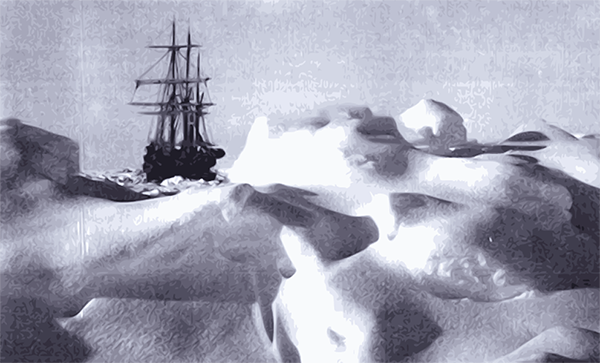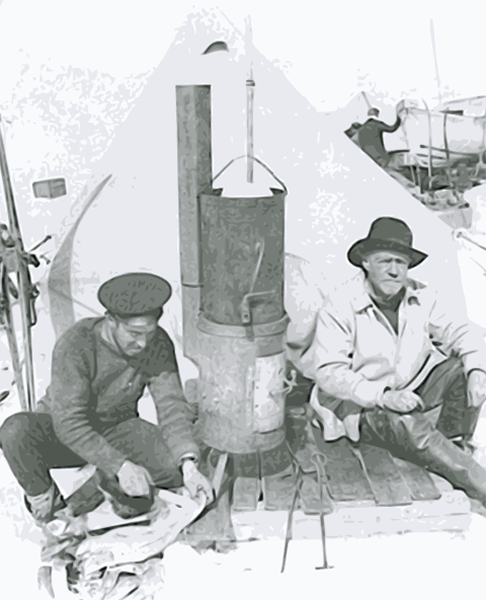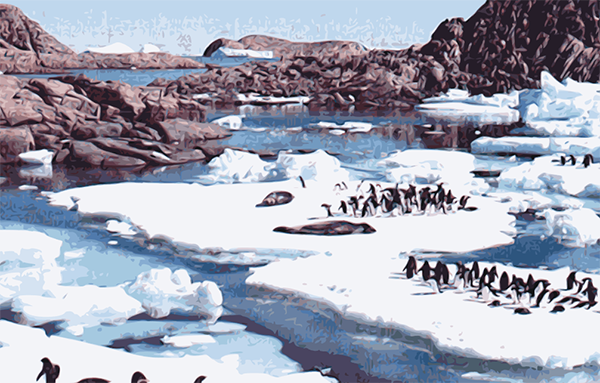Antarctic Adventure
Prologue
Ernest Shackleton was an explorer who wanted to cross Antarctica on foot. He formed a crew and was the leader of a brave expedition that set sail for this continent in 1914. The name of his ship was Endurance. After six weeks of pushing through ice, the ship became locked in ice.
The Endurance Sinks
1 The beginning of the end came on Sunday, October 24, 1915, just after dinner. The Endurance lost the fight.
2 For 278 days the wooden ship had been stuck fast in the dangerous pack ice of the Weddell Sea.
3 Now three huge ice floes were pressing relentlessly around the ship. The Endurance groaned and quivered. Suddenly, there was a terrible crash! Twisted and fatally bent, the Endurance began to let in water.
4 The men pumped water out until they were exhausted. But still the ice floes pressed in, twisting and grinding with a dreadful roaring noise. The ship's timbers cracked and splintered under the pressure.

5 The end came on Wednesday. The Endurance was being crushed. It was sickening to feel the decks breaking up and the ship's great wooden beams bending, then snapping with a noise like gunfire.
6 The ship's stern lifted 20 feet into the air, the rudder tore off, and water rushed forward and froze, weighing down the bow. The icy black sea poured in.

7 Ernest Shackleton looked down into the engine room and saw the engines dropping sideways. He gave the order: abandon ship!
8 The men tumbled out onto the ice, shocked and exhausted. They were standing on a shaking floe, just 2 feet thick, floating on the surface of the deep, dark ocean.
9 That night they camped on the ice. All around them the ice floes groaned and crashed. Three times the ice started splitting and smashing underneath them, and they had to move their tents.
10 Shackleton decided that they had to walk across the pack ice to reach land. But the land he was aiming for was 312 miles away.
11 They set out on Saturday, dragging food, equipment, and the lifeboats from the Endurance over the ice. But in three days, they traveled less than 2 miles.
12 Shackleton decided they had to stop and camp on the ice. The ice would drift north, taking them nearer to land and safety.

13 In a way, the ice was friendly. It was solid underfoot. It gave them water to drink. Seals and penguins used the ice, so there would be food to catch.
14 They chose a large, thick floe for "Ocean Camp." They could still see the Endurance in the distance. Parties of men salvaged what they could from the crushed wreck.
15 One evening, Shackleton saw the Endurance begin to sink. "She's going, boys!" he shouted sadly. The men ran to watch. Their ship upended, bow first, and sank slowly under the ice.
16 The Endurance had been their home for so long. She was their last link with the outside world. They felt very lonely now.
17 Five months later they were still camped. They had drifted slowly north, and now the floes were starting to break up. Their floe heaved and suddenly split. The men crammed into their three lifeboats.
18 After seven days they managed to reach uninhabited Elephant Island and set up camp on the coast. There, Shackleton left 22 of his men in a small hut.
19 With five men, he planned to make a dangerous and daring journey. The island of South Georgia lay 800 miles away, across the wild ocean. They would sail there and get help at one of the whaling stations.
20 In the little James Caird, they made one of the greatest sea journeys ever. After 17 days, they stumbled exhausted onto the shore of South Georgia. But they were on the wrong side of the island.
21 No one had ever crossed the glaciers and mountains of South Georgia on foot, but Shackleton and two of his men did it to reach help. It took three months before.
22 Shackleton was able to rescue the men on Elephant Island. But everyone who had sailed on the Endurance had been saved.
abandon | verb /əˈbændən/ التخلي
To leave without planning to return.
Similar words: desert, forsake, leave behind, quit
bow | noun /baʊ/ مقدمة السفينة
The front part of a ship.
Similar words: prow, fore, front, head
brave expedition | noun phrase /breɪv ˌɛkspɪˈdɪʃən/ رحلة جريئة
A bold journey undertaken for exploration or adventure.
Similar words: daring journey, adventurous trip, quest
crammed | verb /kræmd/ محشور
Packed tightly together.
Similar words: crowded, packed, stuffed, squeezed
crushed | verb /krʌʃt/ سحق
Broken or destroyed by intense pressure.
Similar words: shattered, destroyed, smashed, wrecked
drift | verb /drɪft/ انجرف
To move slowly without control.
Similar words: float, glide, waft, meander
equipment | noun /ɪˈkwɪpmənt/ معدات
Tools and supplies necessary for survival and the journey.
Similar words: gear, apparatus, tools, instruments
exhausted | adjective /ɪɡˈzɔstɪd/ منهك
Extremely tired and drained of energy.
Similar words: fatigued, tired, weary, depleted
floe | noun /floʊ/ طوف جليدي
A large, flat piece of floating ice in the ocean.
Similar words: ice sheet, ice field, glacier, pack ice
glaciers | noun /ˈɡleɪʃərz/ الأنهار الجليدية
Massive, slow-moving rivers of ice.
Similar words: ice rivers, icebergs, ice masses, frozen rivers
groaned | verb /ɡroʊnd/ تأوه
Made a low sound of strain or discomfort.
Similar words: moaned, creaked, grumbled, murmured
heaved | verb /hivd/ رفع أو قذف
Lifted or moved with great force.
Similar words: hauled, lifted, hoisted, tossed
ice floes | noun phrase /aɪs floʊz/ طوفات الجليد
Large areas of floating ice.
Similar words: icebergs, ice masses, ice rafts, frozen sheets
lifeboats | noun /ˈlaɪfboʊts/ قوارب النجاة
Small boats used to escape the Endurance after it was crushed.
Similar words: rescue boats, dinghies, safety boats
pack ice | noun /pæk aɪs/ الجليد المتراكم
A large area of sea ice with a mixture of floating ice pieces.
Similar words: ice sheet, ice pack, frozen layer
quivered | verb /ˈkwɪvərd/ ارتعش
Shook or trembled from pressure.
Similar words: trembled, shivered, shook, wobbled
relentless | adjective /rɪˈlɛntlɪs/ بلا هوادة
Without pause or letting up.
Similar words: continuous, incessant, unyielding, unrelenting
rudder | noun /ˈrʌdər/ الدفة
A flat piece at the back of a ship used to steer it.
Similar words: steering wheel, tiller, control, guide
salvaged | verb /ˈsælvɪdʒd/ تم إنقاذها
Rescued objects likely to be lost.
Similar words: recovered, retrieved, saved, reclaimed
sickening | adjective /ˈsɪkənɪŋ/ مثير للغثيان
Causing nausea or disgust.
Similar words: nauseating, disgusting, revolting, gross
stern | noun /stɜrn/ مؤخرة السفينة
The rear part of the ship.
Similar words: rear, aft, back, tail
timbers | noun /ˈtɪmbərz/ أخشاب
Large pieces of wood used for construction.
Similar words: planks, beams, logs, lumber
tumbled | verb /ˈtʌmbəld/ انقلب
Fell or rolled in an uncontrolled way.
Similar words: fell, toppled, rolled, stumbled
twisted | adjective /ˈtwɪstɪd/ ملتوي
Bent out of shape, usually from damage.
Similar words: bent, distorted, contorted, crooked
uninhabited | adjective /ˌʌnɪnˈhæbɪtɪd/ غير مأهول بالسكان
Without any people living there.
Similar words: deserted, desolate, empty, unpopulated
upended | verb /ʌpˈɛndɪd/ مقلوب
Turned so that one end points upward and the other downward.
Similar words: overturned, flipped, capsized, inverted
water rushed forward | verb phrase /ˈwɔtər rʌʃt ˈfɔrwərd/ تدفق الماء للأمام
The movement of water pouring into the ship.
Similar words: surged, flowed, flooded, gushed
wild ocean | noun phrase /waɪld ˈoʊʃən/ المحيط الهائج
Refers to the turbulent, stormy seas.
Similar words: turbulent sea, stormy waters, rough sea

